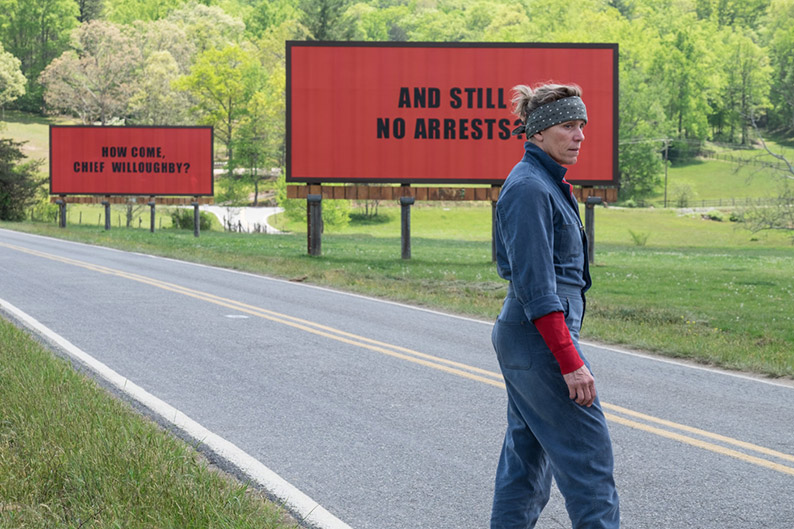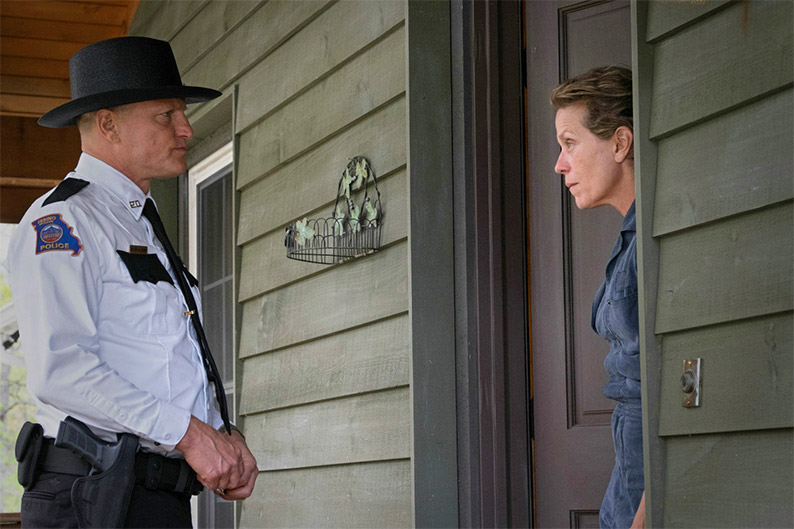| |
"Bullshit. There's no fun in that. It might be fine if you... No, it’s not fine even if you're starting out because it's all about formula, and formulas are fucking boring. That’s why you end up with Marvel and DC films every week, where you know exactly what’s going to happen. It’s just like, 'What kind of computer effect is going to take us there this time?'" |
| |
Director Martin McDonagh is less than enthusiastic about
Robert McKee’s championing of the three act structure* |
Three Billboards is another rather wonderful example of a film sneaking up on you stealthily and genuinely, scene after scene, being darkly delightful. It's still in cinemas (apologies for not getting around to championing this gem sooner – this will teach me not to take advantage of our press accreditation for the London Film Festival) but with any luck, awards will flow – particularly for the acting – and the film will go on to settle comfortably in the category of one of the very best films of the year. I'll be brief. Uh... This is Cine Outsider... Briefer. Than usual.
Mildred Hayes, a bereaved mother from Ebbing, Missouri lost her daughter many months ago to a rapist/murderer and attempts to shame the local police into making some headway on a case the police chief has long abandoned any hope of closing to anyone's satisfaction. She hires the use of (you're way ahead of me) three billboards and puts up her own words of, ahem... 'encouragement' starting with 'Raped while dying...' Needless to say this doesn't go down well with either the residents of Ebbing or its exceptionally provincial police force. The billboards do not break any rules so the townsfolk are stuck with them until Hayes runs out of money to keep them up. Named and shamed on the last billboard, Chief Willoughby approaches Hayes to explain why there is no progress on the case. He presents his own recently diagnosed cancer as a bargaining chip to convince her to stop publically berating him. Batting down his pleas for sympathy, coldly she says something like "Well, they wouldn't be as effective after you croak." Oh, lovely. Here is a woman with whom you do not... Oh, the film is littered with profanity of some of the worst kind but as the film seems to strike a note of realism that can't be denied, you go with the fucking flow, if you know what I mean.

Billboards has three strengths each of which I celebrate with vigour and palpable joy. Across the (bill)board, the performances are superb. As Hayes, the sublime Frances McDormand gives a close to career-best character study in mourning and fierce desire for justice. She's also blackly funny when the need arises. I didn't think Marge from Fargo could be knocked off her personal top spot but here she is, electrifying, hollowed out and yet with a carapace of steel. She's the tortured mother whose last words to her daughter in an argument flashed back in the film were "Yeah? Well I hope you get raped on the way too..." after denying her daughter the car for the evening. Can you imagine the crack in your soul those words would cause after the horrific event? I couldn't keep my eyes off her, her own burning with righteous rage. Matching her is Willoughby played by an actor who brings some Natural Born Killers baggage to his roles, ex-Cheers barman, Woody Harrelson. His performance in War of the Planet of the Apes I thought was particularly noteworthy but in Three Billboards, the depth of his characterisation of the police chief is an on-going and heart-warming surprise. It is also a constant drip feed of humanity regained in the grip of a terminal illness. Harrelson layers his police chief so well and so assuredly that you're never in any doubt that this is a real human being. The spectre of death strips the character of pretence and even after the event itself, beautifully reasoned by the character via the written word to negatively impact as little as possible, it is one of the true wonders of the narrative. Staying with the actors, I have to mention one of the most thankless parts any actor would be required to play. And Sam Rockwell not only knocks it out of the park, he inhabits the loathsome, torturing cop, officer Dixon with such force and commitment that the bastard gets your sympathy for having to bear the yoke of his own ardent stupidity and nastiness. Dixon perhaps makes the most satisfying emotional journey in the movie, but boy, does he pay for it. Vigorous nods and great kudos to both Game of Thrones' Peter Dinklage as James who helps the heroine because it is the right thing to do and Caleb Landry Jones as Red Welby, the unfortunate billboard renter with a huge metaphorical target on his chest. "Bummer of a birthmark, Hal..." if you are a Far Side Gary Larson fan.
Secondly, as alluded to in the opening quote, Three Billboards gleefully subverts the mainstream three act structure that most Hollywood films pay lip – and other body parts' – service to. Yes, in most movies there is a recognisable three-act structure that boiled down goes something like this; here we are, hullo place, hullo characters. Wow, something happens to alter the normal course of events! This is called 'the inciting incident'. We learn that our lead character is either bereft of something she/he wants or there is another goal or wish desired that is pushed to the fore. The second act shows the struggle required for the character to reach her/his aim. At the end of the second act, we lay out the heroine/hero as low as she/he could possibly go to make the audience think "Well, there's no way out of this..." Act three shows the true spirit of the heroine/hero who then prevails and gets what she/he wants. You can apply that enormously ubiquitous structure to almost ninety-five per cent of all movies, even independent and foreign films. Why? Because it works so well but director McDonagh is right. Formulaic movies only offer the surprise of the stops on the journey, not the journey itself. Disney/Pixar's Coco was astounding in all ways except narratively. Once you know how the story ends, you really are just waiting for the cogs of the machine to get you there. McDonagh's own movies (of which I thought In Bruges, was a work of rebellious near-genius) say loudly "Screw you!" to all that intellectualising over formula and structure. This doesn't mean that there aren't satisfying resolutions in terms of the third act pay off. In Bruges has one of the best and the resolution of Three Billboards is extremely satisfying whilst eschewing the oft-trodden road of audience expectation. This is a significant part of this dark movie's charm and yes, I do mean charm.

Thirdly, those last two elements (performance and narrative structure) previously mentioned only make themselves real in the headlight of one of the best screenplays that's come down the pike in a number of years. At the end of every scene there's an emotional pay off, a violent pay off or a narrative pay off. It's like a flight of sublime stairs but each step inhabits another emotional dimension. This isn't to say that it's predictable. Three Billboards is as predictable as a week in the life of a White House press secretary but it's hugely satisfying as drama. Yes of course, the written word is the foundation of any movie but writer/director McDonagh is a brilliant visual interpreter of his own script. He has enough faith in his narrative that flashy direction is expertly quashed. His trust in his marvellous cast to deliver is absolute and therefore what you are seeing is a master craftsperson allowing collaboration to bring his story to the ripest fruition. There are also quite a few implicit and explicit nods to Nic Roeg's Don't Look Now, some of which stretch the credibility of the intentions of the writer/director. I mean, is 'Red' called 'Red' because of the colour of the midget's jacket in Roeg's masterpiece? Hmmm. That is about as much as I can criticise this masterful drama. Oh God, I want to see it again!
That was briefer than usual, wasn't it? See this movie. You'll be talking about it for days afterwards.
|